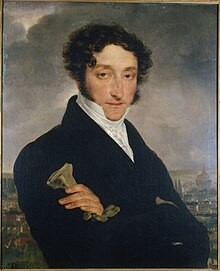Charles Nodier
Charles Nodier (* 29. April 1780 in Besançon ; † 27. January 1844 in Paris ) was a French writer of romance .
Live and act
Nodier was the illegitimate but legitimate son of a lawyer who had risen to become mayor of Besançon and high judge under the Revolution , but who fell into political sideline after 1794. Nodier received a good education and was politically active in his hometown early on, albeit on the anti-revolutionary side. He became a police force in 1799 when he wrote a pro-royalist piece. In 1804 he was briefly imprisoned for a satirical poem against Napoleon . In 1805 he even participated in a conspiracy against the newly proclaimed and crowned dictator. However, he was lucky enough to be saved from harsher punishments by influential acquaintances of his father and to be able to hide and wait somewhere far from Besançon.
After all, during these turbulent years he carried out intensive insectology, linguistic and literary studies, wrote and also married (1808). In 1812, despite his past as a member of the opposition, he was appointed imperial librarian of the newly annexed French Illyrian provinces and spent a year in Ljubljana ( Ljubljana , now the capital of Slovenia ) - a stay that had a great impact on him.
After the rapid loss of the Illyrian provinces in 1813, Nodier settled in Paris , where he had previously only been visiting and where he was now trying to make a living from his pen. Because as a man of letters he was no longer a stranger. B. in 1803 published the little novel Le Peintre de Salzburg, journal des émotions d'un cœur souffrant and in 1804 the volume of poems Essais d'un jeune barde . With the essay Les Tristes ou Mélanges tirés des tablettes d'un suicidé , he wrote one of the first treatises on suicide in 1806 . In 1808 and 1810 he emerged with two linguistic writings. In addition, he had worked early and regularly in magazines as a literary critic (who also looked to England and Germany ). From 1814 he was also active as a political journalist, where he was finally able to campaign on the side that was right for him. H. for the cause of the traditional French monarchy.

Nodier's breakthrough as a narrator came in 1818 with the robber novel Jean Sbogar , set in Slovenia , the tragic ending of a socially committed, noble bandit. He wrote four other novels afterwards, but in literary history his name is primarily associated with the numerous short stories he wrote in the 1820s and 1830s, including many horror novels based on English and German models (e.g. Smarra ou les Démons de la nuit , 1821; Trilby , 1822; La Fée aux miettes , 1832), with whom he introduced the “black romanticism” of ghost and horror stories in France .
After his appointment as director of the Paris Bibliothèque de l'Arsenal (1824), Nodier ran a literary salon in his official apartment , which became the most important meeting place for the first generation of romantics. H. the somewhat younger authors around Victor Hugo . However , he did not take part in their early political swing from royalism to republicanism and liberalism , which in 1833 made his admission to the Académie française much easier.
While Nodier belongs only to the second line of the major French authors, he played an important role as a co-founder of Romanticism in France.
literature
- Winfried Wehle : Art and Subject. From the birth of aesthetic anthropology from suffering from modernity - Nodier, Chateaubriand . In: Fetz, Hagenbüchle, Schulz (eds.): History and prehistory of modern subjectivity , Berlin 1998, Vol. II, pp. 901–941. ( PDF )
- Jörn Steigerwald: Fleeting visions: Charles Nodier's “Les proscrits” . In: Rudolf Behrens, Jörn Steigerwald (ed.): Spaces of the subject around 1800. On the imaginative self-localization of the individual between the Late Enlightenment and Romanticism . Wiesbaden 2010, pp. 221–243.
- Oskar Wiese: Critical contributions to the history of youth and youth work Nodiers (1780-1812). Diss. Kiel, print: Oldenburg 1904, online .
See also
Web links
- Literature by and about Charles Nodier in the catalog of the German National Library
- Works by and about Charles Nodier in the German Digital Library
- Works by Charles Nodier in the Gutenberg-DE project
- Literature by and about Charles Nodier in the SUDOC catalog (Association of French University Libraries)
- Short biography and list of works of the Académie française (French)
- Article in "Name, title and dates of the French. Literature " (source for the section" Life and Creation ")
- Cahiers d'Études Nodiéristes (French)
Individual evidence
- ↑ Pseudonym of Otto Oskar Heinrich (* 1878)
| personal data | |
|---|---|
| SURNAME | Nodier, Charles |
| BRIEF DESCRIPTION | French author |
| DATE OF BIRTH | April 29, 1780 |
| PLACE OF BIRTH | Besançon |
| DATE OF DEATH | January 27, 1844 |
| Place of death | Paris |
